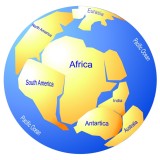About 250 million years ago, all the distinct continents on Earth existed as one large land mass called Pangea. Over millions of years, at a speed comparable to the growth of fingernails, the shifting tectonic plates of the planet fractured and separated Pangea into the different continents we know today. Some of the puzzle’s pieces still fit together, although many of the shapes are now deformed by various geological dynamics. The east side of South America, for example, fits nicely against the west side of Africa, and North America can be moved across the Atlantic so that the Caribbean snuggles into the northwest bulge of Morocco.
The division of Pangea into separate continents had huge environmental implications. First, and perhaps foremost, it meant that species could no longer move freely around one large land mass. The fractures that filled with oceans isolated them, the drifting segments slowly developed very unique ecologies, and distinctive plants and animals evolved in adaptation to those local peculiarities.
This was the situation encountered by humans as they began moving around the planet about 70,000 years ago. Just a mere 500 years ago, during a surge of exploration and colonization, Europe was sending ships to North and South America, to Asia, Africa and elsewhere. The continents, once ecologically isolated for millions of years, were now being reconnected – not geologically by the movement of tectonic plates but by the physical movement of humans transporting commercial products, plants, animals, viruses and their own particular cultures. The world would never again be the same.
Clearly, this process did not suddenly begin with the arrival of Columbus on a remote Caribbean island in 1492. Commercial products and ideas were travelling between Europe and Asia before then. The Bubonic Plague reached Venice from an eastern seaport a few years prior to 1348, before ravishing Europe in successive waves of pandemic death. But the diseases to which Europeans had developed some immunity – smallpox, measles, mumps, chicken pox, rubella, typhus and cholera – were transported to the New World by later explorers, with devastating consequences to the native populations. Think of this as the beginning of globalization.
Globalization is, in effect, a return to Pangea. In the blink of a geological eye, all the barriers that once separated the continents into distinct ecologies are now being dismantled by the international movement of goods, species and people. Norway rats reached most of the world’s ports on sailing ships, traumatizing every ecology where they arrived – sometimes remedial efforts compounded the trauma by introducing other species that were supposed to predate the rats. Eccentric immigrants imported rabbits to Australia and starlings to North America, both species inflicting devastating damage across their respective continents.
Indeed, globalization is a kind of ecological short-circuiting that throws biological systems into pandemonium. More than 250 foreign marine species now inhabit San Francisco Bay, transported there by ballast water discharged by freighters from around the world. The same process has brought an estimated 300 exotic plants and animals to the Great Lakes. The Asian carp that now threaten the entire diversity of the Missouri and Mississippi River systems came from a few fish that washed away from nearby ponds during a flood – these voracious fish are now poised to reach the Great Lakes, expanding their sphere of ecological catastrophe. Atlantic salmon, which belong in the Atlantic Ocean, were deliberately imported to the Pacific for commercial reasons, with complex impacts that could damage an entire marine ecology.
Globalization has essentially removed the barriers of time and space that once protected ecologies from contamination and disruption. Diseases, fungi, insects, mammals, amphibians, birds and plants are all distributed helter-skelter around the planet by ships, planes, cars, luggage, souvenirs, shoes, bodies and just about anything else that moves. The various results are species displacement, population explosions and extinctions.
Ecologies that are wholly incapable of dealing with oil get blanketed in it as international pipelines and global tanker traffic disperse this crude energy from sites of supply to demand. AIDS, a world killer of millions, escaped from an isolated African village because of the mass movement of people around the planet. An obscure disease such as West Nile virus spreads across North America after it inadvertently arrives in a mosquito aboard an airplane arriving in New York from southern Europe. Deadly influenzas skitter around the world with the tides of international travellers.
This globalizing process is even wreaking havoc on distinctive human cultures, as travel, technology and media contaminate unique ways of thinking and understanding. Well-adapted lifestyles are destroyed during this great homogenization process. Languages, essential to preserving and perpetuating cultures, are being obliterated at the rate of one per week. And globalization confuses and debilitates national and local politics as every trade agreement erodes the democratic process by shrinking individual autonomy and robbing resident people of self-determination.
Large as Pangea must have been, it had valleys, deserts, mountains and rivers that would have constrained the movement of species. But, in the New Pangea, no obstacle is great enough to halt the massive tide of movement that is sweeping over the planet. The ecological disturbances it creates are unparalleled in Earth’s history.

